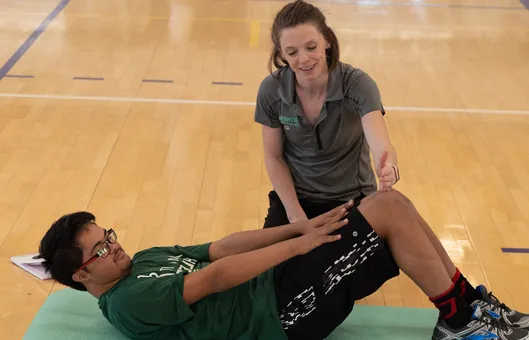Upper Leg Exercises
Modified Hurdler's Stretch
- Target Body Part:
- Legs - Thighs
- Equipment:
- No Equipment
- Difficulty:
-
 Beginner
Beginner
Step 1
Starting Position: Assume a seated position with legs extended in front of you and point your toes towards the ceiling without bending your knees. Gently fold your left leg by bending the knee and tucking the sole of that foot gently against the inside of your right thigh. Sit upright (i.e., trunk vertical) with your head aligned with your spine and place your hands on the top of your thighs.
Step 2
Stiffen (“brace”) your abdominal muscles to stabilize your spine, then gently exhale and slowly bend forward from your hips, sliding your hands down your legs towards your ankles. Attempt to maintain a flat back position and avoid rounding your back towards the ceiling (i.e., move from the hips and not your low back). Keep your head aligned with your spine, knees extended and toes pointed upwards towards the ceiling. This should create a stretch through your hamstrings and calf muscles, with some stretching in your low and middle back.
Step 3
Continue to bend and reach forward to the point of tension in the stretch, but do not bounce or push to a point of pain. Hold this position for 15 - 30 seconds, then relax by returning to your starting position and repeat 2-4 times. You may elect to grasp your ankles to hold this position. Repeat with the opposite leg
Step 4
Exercise Variation: This stretch can become more dynamic by performing slow, controlled movements to complete 1 set of 5 - 10 repetitions, holding the stretched position for 1 - 2 seconds.
To maximize the benefits of a stretch and reduce the potential for injury, it is often important to stretch only to the point of tension, avoid bounding, and control movement at other segments of the body. During this stretch, avoid any excessive rounding of your low back.
Share:

Inclusive Fitness Training
Create fitness opportunities for people with intellectual disabilities!
Learn MoreCourse!




